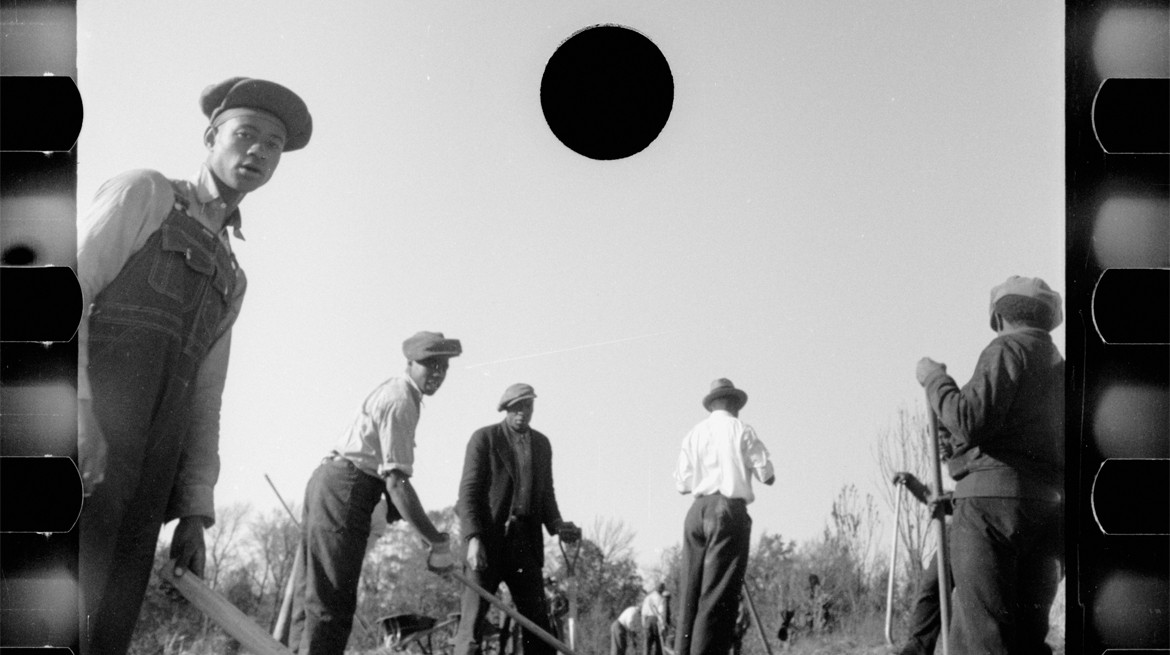Killed Negatives
Unseen Images of 1930s America
16 May - 26 Aug 2018

Carl Mydans
Untitled photo (detail), possibly related to: Transients clearing land.
Prince George’s County, Maryland, November 1935
digital print from scanned 35mm b&w negative
Library of Congress, Prints & Photographs Division, FSA/OWI Collection, [reproduction number, LC-DIG-fsa-8a00531]
Untitled photo (detail), possibly related to: Transients clearing land.
Prince George’s County, Maryland, November 1935
digital print from scanned 35mm b&w negative
Library of Congress, Prints & Photographs Division, FSA/OWI Collection, [reproduction number, LC-DIG-fsa-8a00531]
KILLED NEGATIVES
Unseen Images of 1930s America
16 May – 26 August 2018
Thousands of negatives by American photographers were systematically destroyed in the 1930s; these irreparable images were known as ‘killed negatives’.
Roy E. Stryker, head of the Information Division of the Farm Security Administration (FSA), launched a historic photographic initiative between 1935 and 1944. In order to expose American rural poverty, the FSA commissioned photographers, including Walker Evans (1903–1975) and Dorothea Lange (1895–1965), to record the struggles of rural life following the Great Depression. Omitted from the story of this landmark documentary project is the ruthless method of editing Stryker deployed for the final selection. The negative of each rejected image was punctured with a hole puncher; if a print was made the image would feature a black disc, floating surreally over faces and landscapes.
This display presents prints made from some of the rejected negatives as well as photographers’ personal and administrative records. Also included are contemporary artists’ responses to these haunting images. The photographs transform an act of censorship into abstract, conceptual and strangely beautiful pictures.
FSA photographers include Paul Carter, Jack Delano, Walker Evans, Theodor Jung, Dorothea Lange, Russell Lee, Edwin Locke, Carl Mydans, Arthur Rothstein, Ben Shahn, John Vachon, Marion Post Wolcott, alongside contemporary works by Etienne Chambaud, Bill McDowell, William E. Jones and Lisa Oppenheim.
The Whitechapel Gallery Archive Displays are generously supported by Catherine Petitgas
This exhibition has been generously supported by the Killed Negatives Exhibition Circle:
Beth & Michele Colocci
Andy Simpkin
Unseen Images of 1930s America
16 May – 26 August 2018
Thousands of negatives by American photographers were systematically destroyed in the 1930s; these irreparable images were known as ‘killed negatives’.
Roy E. Stryker, head of the Information Division of the Farm Security Administration (FSA), launched a historic photographic initiative between 1935 and 1944. In order to expose American rural poverty, the FSA commissioned photographers, including Walker Evans (1903–1975) and Dorothea Lange (1895–1965), to record the struggles of rural life following the Great Depression. Omitted from the story of this landmark documentary project is the ruthless method of editing Stryker deployed for the final selection. The negative of each rejected image was punctured with a hole puncher; if a print was made the image would feature a black disc, floating surreally over faces and landscapes.
This display presents prints made from some of the rejected negatives as well as photographers’ personal and administrative records. Also included are contemporary artists’ responses to these haunting images. The photographs transform an act of censorship into abstract, conceptual and strangely beautiful pictures.
FSA photographers include Paul Carter, Jack Delano, Walker Evans, Theodor Jung, Dorothea Lange, Russell Lee, Edwin Locke, Carl Mydans, Arthur Rothstein, Ben Shahn, John Vachon, Marion Post Wolcott, alongside contemporary works by Etienne Chambaud, Bill McDowell, William E. Jones and Lisa Oppenheim.
The Whitechapel Gallery Archive Displays are generously supported by Catherine Petitgas
This exhibition has been generously supported by the Killed Negatives Exhibition Circle:
Beth & Michele Colocci
Andy Simpkin
